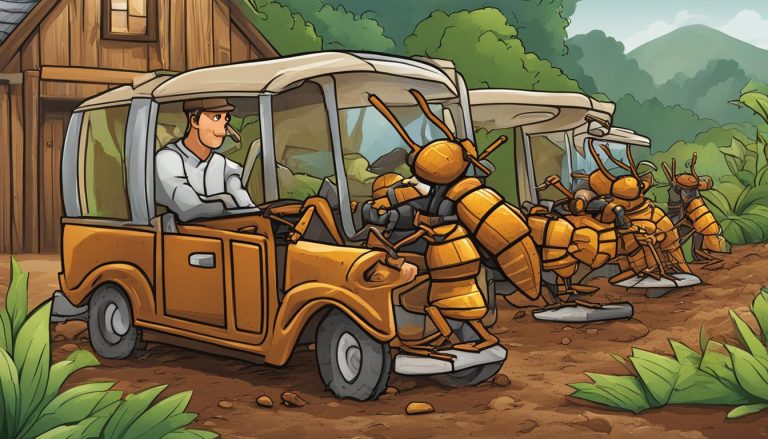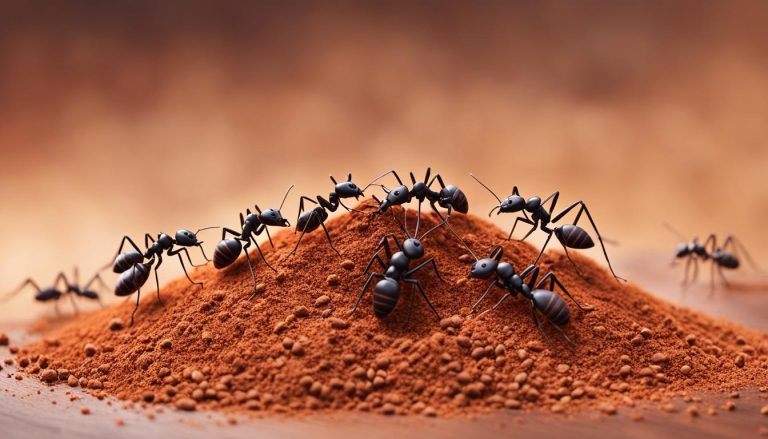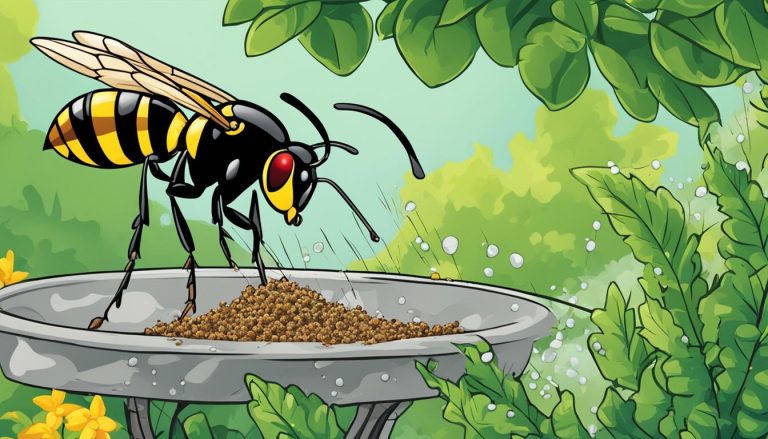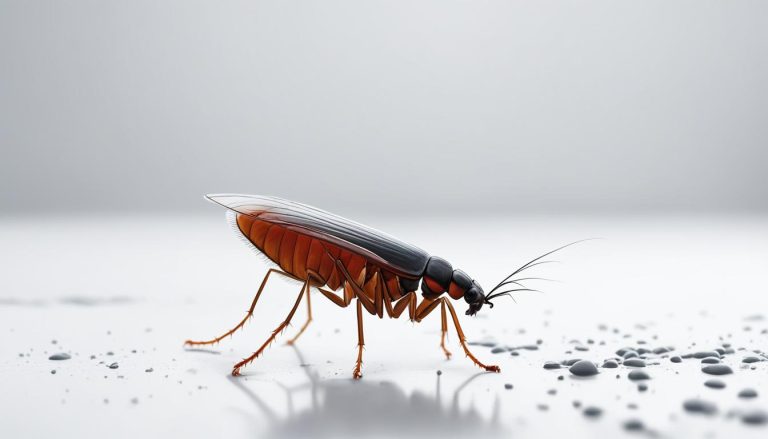Struggling with ants in your garden? We’ve all been there. Finding the right outdoor ant control methods can be a bit of a puzzle. But fret not! You don’t need a science degree to tackle those pesky little intruders. With some handy DIY outdoor ant control tips, you can bid farewell to them.
Safe ant control solutions are top-notch for both your family and the environment. And, hey, who doesn’t love something that’s not only friendly but also effective for outdoor ant removal? Now, to keep those ants from crashing your BBQ, consider using tried-and-true products and sprinkle in some smart prevention. Yeah, that’s right, ant infestation prevention is key!
Looking for something that sticks around? Long-lasting ant control methods can make sure ants think twice before strolling into your space. Put some barriers up, and keep them from coming back. Easy-peasy!
Right then, ready to get cracking? Keep on reading for some top-notch tips that even the little ones can help out with. It’ll be a walk in the park!
Key Takeaways
- Choose safe ant control solutions safe for family and the planet.
- Use effective outdoor ant removal tips for immediate relief.
- Keep the ants at bay with long-lasting ant control methods.
- Prevent future invasions with smart ant infestation prevention practices.
- Remember, a good offence is the best defence in DIY outdoor ant control.
Understanding Outdoor Ant Behaviours and Habitats
Outdoor ant management requires acknowledging how certain actions can impact ant behaviours, their habitats, and infestation patterns. By responding strategically to the evolving conditions in Perth, such as water restrictions and soil quality, homeowners can employ the best ant control methods for their outdoor spaces.
Watering Practices and Ant Attraction in Perth
Ants in Perth have magnificent survival strategies that include thriving in the city’s dryer conditions, a trait that becomes challenging with imposed water restrictions. The struggle to keep gardens and lawns lush without attracting ants often leads gardeners to search for natural ant repellents and sustainable solutions. An evenly moist soil environment is less attractive to ants and can be maintained with effective watering practices.
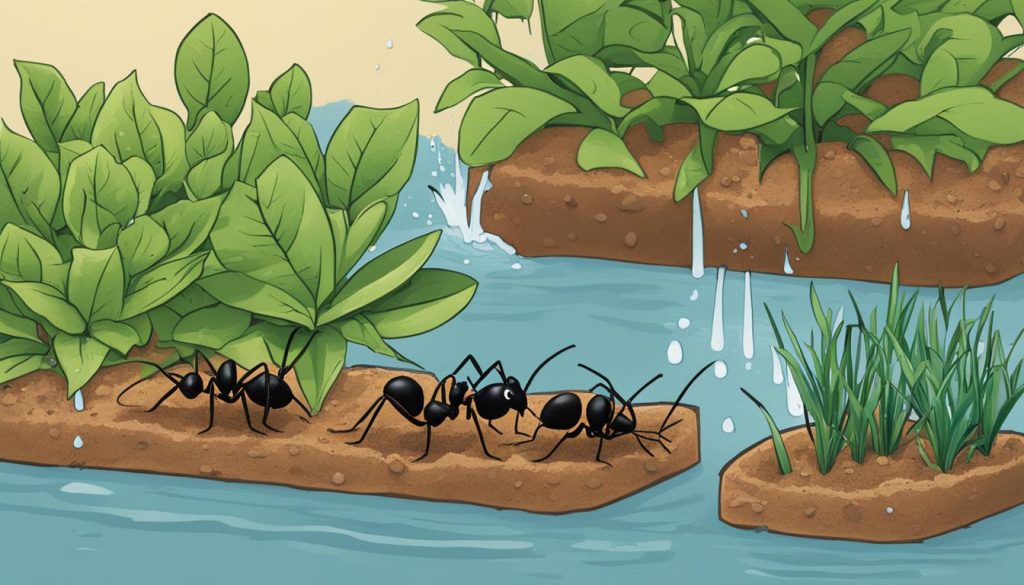
Ant Nesting Preferences in Hydrophobic Soils
When soil becomes hydrophobic, it repels water, causing irrigation to run off rather than penetrate the ground. This creates an environment conducive to ant nesting. Garden health can be improved, thus deterring ants, through the application of commercial-grade wetting agents. These agents ensure water is absorbed into the soil, making it less hospitable to ant colonies.
Impact of Sparse Turf on Ant Colonization
A thin or patchy lawn is an open invitation to ant colonies. Strengthening turf by regular watering and fertilization not only enhances greenery but reduces the chances of ant infestations. In the search for effective outdoor ant removal strategies, natural lawn care practices can be among the most potent deterrents against ant colonization.
For gardeners considering organic ant control products, identifying the type of insecticide to use is important. Some products may affect non-targeted species and pets. Therefore, understanding the distinct qualities of contact, residual, systemic, and bait-type insecticides can lead to more responsible and targeted applications when professional outdoor ant extermination is not required.
Chemical Treatments: Identifying the Most Effective Insecticides
When it comes to best ant control methods, choosing the right chemical treatment is critical for professional outdoor ant extermination. Broadly speaking, different insecticides have their unique benefits and risks. Here’s a simple guide to help you understand which chemicals are the safest yet most effective against those pesky ants.
Ingredients like Fipronil and Deltamethrin are known to be very powerful in combating ant invasions. They are relatively safe ant control solutions, taking care not to harm humans or pets, as long as they’re not touched while wet. Some products you might hear about can be highly effective but carry risks for certain animals, like Bifenthrin, which should be used with caution around cats.
Moreover, if you’re considering the environmental impact, you should note that Permethrin could be harmful to bees and aquatic creatures. The same goes for Imidacloprid, so reading the labels and using these products sensibly is important for keeping our gardens and natural ecosystems healthy.
Just remember, the best chemical to use depends on the ants you’re dealing with. For instance, Amdro bait is tailored for Coastal Brown Ant control.
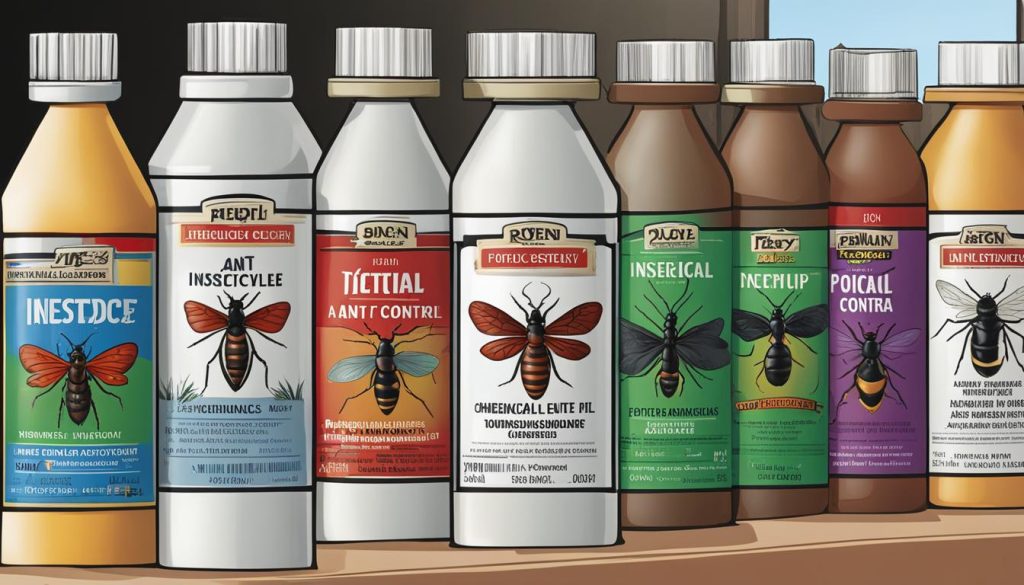
| Insecticide | Active Ingredient | Ant Species | Environmental Safety |
|---|---|---|---|
| ANTHEM Ant Granules | Fipronil | General Ant Control | Safe after drying |
| Synergy Pro Ant Bait | Fipronil | General Ant Control | Safe after drying |
| Amdro Ant Bait | Hydramethylnon | Coastal Brown Ants | Cautious use recommended |
| David Grays Antex | Bifenthrin | General Ant Control | Not safe for cats |
Make sure you match the insecticide to the specific ant species in your garden, and use enough to reach the queen. Only by taking out the queen can you really put an end to your ant problem for good!
- Read all labels carefully for safe and effective usage.
- Consider the insecticide’s impact on the environment and non-target species.
- Match the chemical to the ant species for the best results.
By following these simple tips, you’ll be well on your way to reclaiming your outdoor space from those unwelcome ant guests!
Selecting the Right Outdoor Ant Control Products
As we explore options for effective outdoor ant removal, the choice between various ant control products can make a huge difference in maintaining a comfortable living space free from these persistent insects. It’s vital to consider factors such as effectiveness, cost, and the health of our environment when making a decision.

Top-Rated Ant Control Products for Australian Homes
Homeowners often seek the best solutions that promise effective outdoor ant removal. Products like ANTHEM Ant Granules and Synergy Pro Ant Bait stand out in the market. They contain Fipronil, which is known for wiping out ant colonies by reaching the queen. These products are effective against a range of ant species, ensuring your home and garden remain ant-free.
Natural Versus Chemical Ant Remedies: Which to Choose?
Considering the safety and environmental impact, natural ant repellents are gaining popularity. Ingredients found at home, such as baking soda and borax, offer alternative solutions for ant problems without the chemical footprint of synthetic products. These natural options are not only safer for our furry friends and the local wildlife but also contribute to a healthier ecosystem around our homes.
Understanding Product Safety for Humans and Pets
When it comes to choosing organic ant control products, it’s essential to consider the safety of our family and pets. Natural repellents can be as simple as vinegar or lemon juice, which disrupt the pheromone trails of ants, making it difficult for them to navigate. However, ensure that any product used around the home is non-toxic and pet-friendly to prevent inadvertent harm to your loved ones.
| Product Type | Active Ingredient | Effectiveness | Safety | Environmental Impact |
|---|---|---|---|---|
| ANTHEM Ant Granules | Fipronil | High | Moderate | Low |
| Synergy Pro Ant Bait | Fipronil | High | Moderate | Low |
| Baking Soda & Borax Baits | Natural Compounds | Moderate | High | Minimal |
| Vinegar Solution | Acetic Acid | Moderate | High | Minimal |
Conclusion
In wrapping up our discussion on ant control within your garden, it’s clear that consistent measures form a solid defense against these persistent invaders. Regular lawn maintenance paired with effective moisture management can create an environment that’s less alluring to ants. Furthermore, an arsenal consisting of both chemical and **natural ant repellents** is key to ensuring your outdoor spaces remain ant-free. While these methods are typically sufficient for most homeowners, some situations may call for a deeper level of intervention.
Integrating Ant Control within Your Garden Care Regimen
As with any garden care practice, the integration of ant control techniques should be a seamless aspect of your routine. Employing **long-lasting ant control methods** not only keeps your garden healthy but also actively deters potential infestations from taking root. By treating ant control as an integral part of garden care, you position yourself to spot early warning signs and take action swiftly.
Consulting Professionals for Chronic Ant Infestations
When do-it-yourself remedies fall short, it’s time to call in the experts. Seeking help from **professional outdoor ant extermination** services can make all the difference. These specialists possess the know-how to implement more powerful treatments and can provide advice tailored to your unique needs. With their help, you can reclaim your garden and maintain it as a pleasant retreat for family and friends.
FAQ
What are some DIY outdoor ant control tips for managing infestations?
A few effective DIY outdoor ant control tips include using bait stations with borax and sugar mixtures, applying diatomaceous earth around areas of ant activity, planting ant-repellent herbs like mint and lavender, and maintaining a clean yard free of food residue and standing water.
How can I use natural ant repellents to prevent ant infestation?
Natural ant repellents can include a variety of household substances like lemon juice, vinegar, essential oils (peppermint, tea tree, eucalyptus), and spices such as cinnamon. These can deter ants when applied to entry points and around the perimeter of your home.
Are there safe ant control solutions that won’t harm pets or the environment?
Yes! Safe ant control solutions include using natural repellents, borax-based baits that are placed out of reach of pets, and organic products that contain ingredients like spinosad, which target ant colonies while being less harmful to non-target species.
What are some long-lasting ant control methods?
Long-lasting ant control methods often involve a combination of solutions, including baiting systems that target the colony, regularly scheduled pest control treatments, and creating an unfavorable environment for ants through good garden hygiene and moisture management.
How do excessive watering and dry conditions in Perth attract ants?
In Perth, excessive watering used to deter ants by keeping the soil moist and less appealing for nesting. However, due to water restrictions and the preference of ants for dry conditions, soil can become hydrophobic, creating ideal nesting spaces for ants. Thus, moderated watering and the use of commercial-grade wetting agents are recommended.
Why do ants prefer to nest in hydrophobic soils?
Hydrophobic soils repel water, resulting in dry conditions that are preferable to many ant species. They offer safe havens for ants to build their nests and protect their colonies from excessive moisture, one of the reasons why ants may be more attracted to lawns with water-repellent soils.
How does sparse turf contribute to ant colonization?
Sparse turf creates open spaces and exposed soil, which can be more easily excavated by ants to create nests. Dense, healthy grass, on the other hand, can deter ant colonization by leaving less accessible soil for ants to utilize.
Which chemical treatments are most effective for outdoor ant extermination?
Chemical treatments that contain Fipronil and Deltamethrin are considered quite effective for outdoor ant extermination with minimal risk to non-target species. Products such as ANTHEM Ant Granules and Synergy Pro Ant Bait have proven capabilities in eliminating entire colonies.
What top-rated ant control products are recommended for Australian homes?
For Australian homes, products containing Fipronil, such as ANTHEM Ant Granules and Synergy Pro Ant Bait, are often recommended. Bait stations with specific attractants for different ant species such as Amdro for Coastal Brown ants are also highly rated.
How do I choose between natural and chemical ant remedies?
Choosing between natural and chemical ant remedies depends on the severity of the infestation, environmental safety considerations, and personal preference. For mild issues, natural remedies may be sufficient, but for larger infestations, chemical treatments might be necessary for effective control.
Why is it important to understand product safety for humans and pets when dealing with ant control?
Understanding product safety is crucial because some ant control products contain ingredients that can be toxic to humans, pets, and beneficial insects like bees if not used correctly. Always read labels and follow instructions to ensure safety while effectively controlling ant populations.
Why should ant control be part of my garden care regimen?
Integrating ant control into your garden care regimen helps maintain the health of your lawn and plants by preventing damage from ant nests and foraging activities. It also reduces the risk of infestations within your home.
When should I consider consulting professionals for my ant problem?
If you have tried various methods and the ant infestation persists or continues to grow, it’s time to consult professionals. They can provide specialized treatments and advice on long-lasting control methods suited for the specific type of ants and environmental factors in your area.

